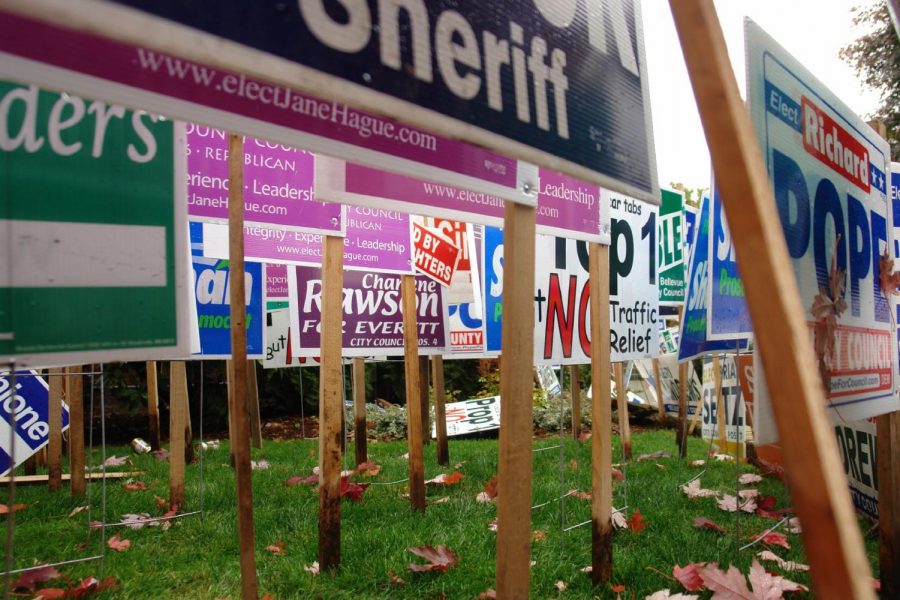Scott: Taking the Protest to Your Neighbor’s Porch
August 11, 2020
Every year, we write a new version of the same article encouraging students to become involved in local politics. We build our case that college students have a unique passion for making a difference, that voting is a civic duty and yes, you can even get college credit for a political internship through the Hinckley Institute.
These points remain true today, but frankly, I am not sure how much they resonate with students who are living in a world that feels torn apart by COVID-19, police brutality and threats to deport international students. Even experienced campaign volunteers are likely looking apprehensively at balancing the stress of another election season with an uncertain fall semester. The first six months of 2020 have already taken so much, and you’re telling us to invest in strenuous elections that will drag out until November?
In short, yes. Feelings of burnout and fear are justified. You may not feel inspired by any particular major candidates — and that’s fair, too. It is unlikely that anyone can promise unlimited energy to a candidate right now, but young people cannot afford to completely opt-out of campaign season this year.
Voting, Protesting and Social Media Activism Should Be Combined
In the wake of recent protests, some young people have argued that voting is an ineffective means of encouraging change. Voting is important, but preaching “just vote” and nothing else can minimize valid experiences of pain, downplay the very real accomplishments of protest and ignore structural efforts to suppress the vote. It is, at the very least, fathomable how people fall into the belief that their vote doesn’t matter.
And with the world as broken as it is, it’s wrong to tell people that all they need to do to fix it is cast a vote. Voting is a valuable resource for civic engagement, but as we have seen between social media activism and protesting, it is not the only tool in our belt. We need to expand our options and working on a campaign is a good place to start.
A Little Goes a Long Way
Most political campaigns are scrappy, fast-paced organizations where every volunteer counts. You can make a difference for the candidates you care about by lending them your time, talent and social skills — which is especially important if you want to see more politicians who share your values. There is no shortage of good campaigns in need of help this year — even if it takes looking past national or state-level races to find someone who inspires you. Whether it’s a vulnerable incumbent or a talented newcomer in need of boots on the ground, working with candidates is a great way to push your ideas forward.
At their core, successful politics are based on relationships. By volunteering with a campaign, you learn about the candidate, their desired office and the constituents — all important pieces of the policy puzzle. If you understand the limitations of the office or the needs of the district, you are better able to hone your advocacy efforts. Politicians are not — or at least should not be — inaccessible enigmas, and whether campaign experience gives you the know-how to lobby a bill or simply contact your legislators, it will have been a net positive.
Support Legislators Who Fight For the Issues You Care About
On May 25, George Floyd was killed in Minneapolis by a police officer who kneeled on his neck for nearly eight minutes. On June 18, legislators in Utah met in a special session to ban police from using knee-on-neck chokeholds because they heard the call to action within the community. Clearly protests work, but it was also crucial to have legislators with shared values and a willingness to listen. This legislation was progress, but it alone will not solve the problem — years of collaborative work are necessary to rewire larger structural problems. This November, we can help elect legislators who are willing to listen by volunteering for their campaigns.
The reality of effective advocacy is that people who truly care will have to demonstrate that in many ways. They can do so by protesting, marching, voting, contacting their representatives, educating themselves and others, sharing information on social media and, as I hope you will now consider, joining a local campaign this election year. There are so many inspiring, principled candidates out there who are passionate about the issues that you care about — many of them just need a good team and that’s where we come in.








